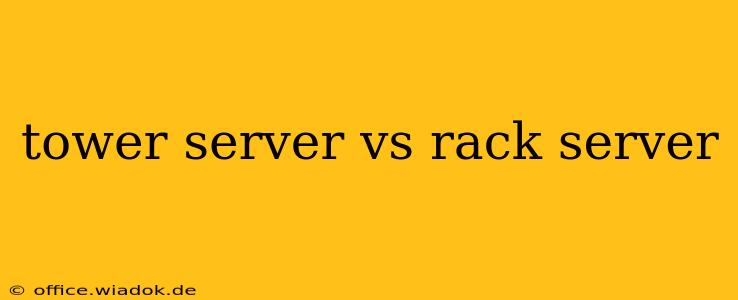Choosing the right server for your business or personal needs can be a daunting task. Two of the most common server types are tower servers and rack servers. While both perform similar functions – processing data and running applications – they differ significantly in their form factor, capabilities, and suitability for various environments. This comprehensive guide will dissect the key differences between tower and rack servers, helping you make an informed decision based on your specific requirements.
Understanding the Physical Differences
The most striking difference between tower and rack servers lies in their physical design.
Tower Servers: The Desktop Giant
Tower servers resemble oversized desktop computers. They stand vertically and are typically housed in a large, tower-shaped chassis. Their size allows for easy access to internal components, making them ideal for smaller businesses or individuals who need easy maintenance and upgrades.
Key Characteristics:
- Form Factor: Large, freestanding tower.
- Accessibility: Easy access to internal components for maintenance and upgrades.
- Cooling: Typically relies on internal fans for cooling.
- Expansion: Offers various expansion slots and bays for storage and peripherals.
- Power: Typically uses a standard power cord.
Rack Servers: The Data Center Workhorse
Rack servers are designed to be mounted in a 19-inch rack, a standardized cabinet used in data centers and server rooms. They are much more compact than tower servers, allowing for a higher server density in a limited space. This makes them the preferred choice for large organizations and data centers.
Key Characteristics:
- Form Factor: Compact, designed for mounting in a 19-inch rack.
- Accessibility: Requires rack access for maintenance and upgrades; often more challenging.
- Cooling: Frequently uses specialized cooling systems within the rack.
- Expansion: Expansion capabilities are often limited by the rack space.
- Power: Typically uses specialized power connectors for redundancy and efficiency.
Comparing Key Features and Considerations
Beyond their physical differences, several crucial factors differentiate tower and rack servers:
1. Scalability and Expansion:
- Tower Servers: Offer good expansion capabilities but are limited by their physical size. Adding more components can become cumbersome.
- Rack Servers: Scalability is often determined by rack space and the design of the server itself. While expansion might require more planning, rack servers can be more easily scaled within a data center environment.
2. Power Consumption and Cooling:
- Tower Servers: Generally consume more power and generate more heat than rack servers, especially when configured with multiple high-performance components.
- Rack Servers: Designed with efficiency in mind, rack servers often feature more sophisticated cooling solutions, leading to reduced power consumption and better heat management within a rack environment.
3. Maintenance and Accessibility:
- Tower Servers: Easier to access and maintain components due to their design. Upgrades and repairs are typically straightforward.
- Rack Servers: Maintenance and upgrades require rack access and specialized tools, potentially involving downtime.
4. Cost:
- Tower Servers: Generally less expensive upfront than rack servers with comparable specifications.
- Rack Servers: The initial investment is typically higher, reflecting their superior capabilities and features optimized for data center environments.
5. Noise Levels:
- Tower Servers: Can be noticeably louder than rack servers due to their cooling system and the lack of sound dampening in the chassis.
- Rack Servers: Often designed with noise-reducing features, making them quieter in operation.
Choosing the Right Server: Making the Decision
The best server type depends entirely on your specific needs:
-
Choose a Tower Server if:
- You need easy access for maintenance and upgrades.
- You have a limited budget and don't require high server density.
- You're running a small business or a home server.
- Space isn't a major constraint.
-
Choose a Rack Server if:
- You require high scalability and density in a data center environment.
- You need robust cooling and power management.
- You prioritize efficient power consumption and reduced noise levels.
- Reliability and up-time are paramount.
By carefully considering these factors, you can confidently choose the server that best meets your technical requirements, budget, and overall business objectives. Remember to consult with IT professionals for expert guidance on your specific server needs.

